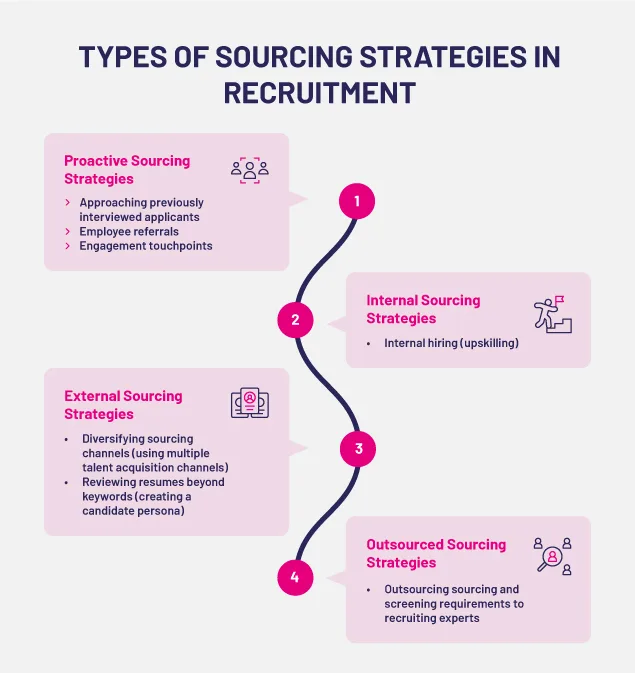Topics: Offshore RPO Services, Sourcing Strategies, Talent Sourcing
Posted on September 13, 2024
Written By Sakshi Sharma

Attracting top talent is essential for an organisation’s growth, and creative sourcing strategies in recruitment are vital to achieving this. Talent sourcing or candidate sourcing is the process of identifying the right people for a job opening.
According to a survey by Glassdoor, the average job opening attracts around 250 applicants, but only 2% of those applicants are interviewed, and a mere 0.5% are hired. Moreover, the Society for Human Resource Management (SHRM) reports that the average cost-per-hire is around £316.31, and the average time-to-hire is 42 days.
Sourcing strategies in recruitment need to be proactive, and the process of sourcing and screening candidates must consider both active and passive candidates in the talent pipeline. To overcome these challenges, recruiters need to adopt creative and proactive candidate sourcing strategies to identify and attract the right candidates. In fact, a study by LinkedIn found that 75% of potential candidates are passive job seekers, meaning they are not actively looking for a job but are open to new opportunities. By leveraging the right sourcing strategies, recruiters can tap into this vast talent pool and find the best fit for their organization.
In this article, we will explore six effective candidate sourcing strategies used by successful recruiters to find top talent, including approaching previously interviewed applicants, employee referrals, engagement touchpoints, internal hiring, diversifying sourcing channels, and reviewing resumes beyond keywords. By implementing these strategies, recruiters can improve their chances of finding the best candidates, reducing time-to-hire, and increasing the quality of hire.

Considering past applicants helps you start at least three steps ahead of the process. These are applicants you have identified, screened, and interviewed preciously. There are many candidates who did not qualify for a role for any reason previously. They are part of the database and can be considered for future opportunities. Since they are already screened and interviewed with their qualifications assessed, they could prove to be a quick match for the current role.
Referrals are a time-tested technique for sourcing good candidates. Recruiters know the importance of using professional networks and leveraging their interpersonal connections. Referrals also save HR professionals a lot of time, resources, and effort. According to LinkedIn Research, referred candidates are four times more likely to be hired, and 45% of the candidates hired through referrals stay for four years or more with the company.
Recruiters should engage with prospective candidates and communicate via cold email and messaging to maintain at least three touchpoints in a month. This is likely to motivate engagement and build a strong relationship with candidates, increasing their likelihood of applying for the company’s position. Good communication and engagement between the recruiter and the prospects enable recruiters to gauge the personalities and qualifications of potential applicants.
One of the most reliable sourcing strategies in recruitment is internal hiring which implies finding suitable candidates to fill the open position from within the company’s existing employees. Recruiters need not bother to source and screen hundreds of resumes when a suitable candidate is right in front of them. Also known as upskilling, this is a great way to fill open vacancies with qualified candidates and, at the same time, promote a culture of internal growth for employees improving retention rates and productivity.
Using diverse talent acquisition channels allows recruiters to find hidden gems and reach out to a larger audience. Multiple supply channels are better than sticking to one or two traditional sources. For example, not all prospects use LinkedIn or check it rigorously for job opportunities. If recruiters use diverse channels to post job openings, it is highly likely to reach out to good-quality prospects. Using dedicated sourcing platforms such as GitHub, for developers, Behance for graphic designers, and other such channels is also a great way to diversify sourcing.
Applicant tracking Systems (ATS) are designed to identify suitable candidates based on resume keywords. But relying solely on ATS is inadvisable because the candidates that appear on top of the search due to rightly placed resume keywords may not be your best-fit candidates. These could just be the candidates who paid more to use resume writing services that embed keywords in their customer’s resumes to help them rank higher in the ATS (according to research by various recruiting intelligence websites, about 10% of applicants use professional resume writing services). A better sourcing strategy is to create a candidate persona to identify the ideal candidate and use diverse sourcing channels to review resumes, such as social media platforms and other online and offline channels.
A third-party specialist can be hired to outsource all your candidate sourcing and screening requirements. Outsourcing helps to save money and reduces time-to-hire while improving the quality of hire. QX Global Group is a leading offshore recruitment services provider with dedicated RPO solutions for staffing and recruitment industries. QX Offshore Recruitment Services offer candidate sourcing, market mapping, executive search, headhunting services, CV formatting, and resume sourcing to help recruitment agencies find qualified candidates for their clients and meet their hiring goals. Talk to one of our experts today to learn more about how our offshore and nearshore RPO solutions can help your business grow.
Originally published Sep 13, 2024 01:09:57, updated Sep 24 2024
Topics: Offshore RPO Services, Sourcing Strategies, Talent Sourcing